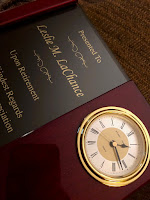And apparently, the book I received this month is intended as a kind of keepsake too, because it says so in subtitle right there on the cover: The Healing Heart: A Special Family Keepsake, just above an embossed dedication to the memory of my father. Inside are pages upon which I am encouraged to write down the details of his funeral and burial, pages for filling in my dad's ancestry, and a page to list favorite memories. The book, a "gift" from The Heritage Company, also contains many pages of instruction and advice about how to grieve properly. Oh, and tucked handily between the cover and first page is a note listing the "caring friends and neighbors" in my local business community who funded this little project: a bank, a realty company, a water treatment service, a tire shop, a flower shop, and the funeral home. Along with the note is a booklet of small postcard thank you notes that, according to the booklet instructions, I am encouraged to send to those merchants.
I did not know projects like this, a funeral book with local sponsors (and by local, I mean my hometown of Saugerties, not Nashville, where I live now), existed. But I do know it immediately for what it is – a collaboration between the funeral home and The Heritage Company to turn a buck. And I suppose someone else might have opened the package and thought the book a nice thing to have, and perhaps might have been helped by it in their grief. But I find it creepy and a little predatory. I mean, a sponsored funeral keepsake book with accompanying instructions for grieving, along with a command to send thank you notes to said sponsors? I think I'm entitled to be weirded out by this "gift."
The second package, bigger and much heavier than the first, contained a desk clock. Or, to be more precise, it is a clock mounted in a piece of polished wood next to a plaque bearing my name and explaining that the clock was being sent to me upon my retirement in gratitude for my years of service in the classroom. I thought the tradition of clock- or gold-watch-giving on the occasion of
one's retirement had gone the way of the company pension plan, but no. And now here I am with an unasked for reminder of my own mortality. Tick. Tick. Tick. I would have maybe preferred an actual pension. Or if I had to be measuring something, perhaps an astrolabe. And what a strange tradition anyway. Retirement means not having to keep track of time, or at least not so very much. I wonder how many gold retirement watches got a second life in the pawn shop? My husband now and then likes to tell a story about a relative who worked her entire life in a cotton mill in a small West Tennessee factory town. She never missed a day of work, and she was never late. Of course the company gave her a clock in appreciation when she retired, and she, by all accounts, fairly relished the irony of any suggestion that she needed a timepiece.
I suppose there's more to say here about the macabre serendipity of the book and the clock arriving at my house around the same time, these little gods of death, but I'm not going to read too much into the symbolism. It's enough that I have scans this week, and an appointment to see Dr. Shaw in Boston next week. Even without the funeral book or the retirement clock, I've got plenty to remind me that death is out there angling for me, for all of us. And what do we say to the god of death? Not today.







All very strange and random. Sending you love and light always.
ReplyDeleteI had to laugh at your "Tick. Tick. Tick." because although I've always been familiar with companies giving watches and time pieces to their retirees, it sounds funny, now that you say it, to think about giving something that reminds one of their age and mortality as a way of thanking them.
ReplyDeleteI'm all for re-purposing and turning things like that into mixed media art. Pop out the clock, paint over the shellacked wood, and put the clock back in upside down. Tear the pages out of the book and make plantable seed paper with it.
Time to shake things up :)